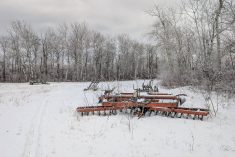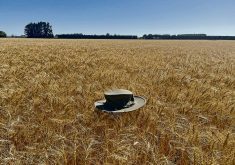Norman Borlaug, the Nobel Peace Prize-winning plant scientist whose work on food crops linked agricultural productivity to stability in developing countries, died Saturday night at age 95.
Texas A+M University, where he had held the title of Distinguished Professor of International Agriculture in the department of soil and crop sciences since 1984, confirmed in a release that Borlaug died from complications of cancer in Dallas.
Born to a farming family in Iowa in 1914, Borlaug studied and worked in forestry before earning his Ph.D. in plant pathology at the University of Minnesota in 1942.
Read Also

CBOT Weekly: Expect sideways trading for now
Look for trading of soybeans, corn and wheat at the Chicago Board of Trade remain sideways for the balance of January, perhaps longer, said Ryan Ettner, broker with Allendale Inc. in McHenry, Ill.
Borlaug’s wartime work until 1944 was as a microbiologist for the du Pont de Nemours Foundation, leading research on industrial and agricultural bactericides, fungicides and preservatives.
In 1944 he became a scientist for the Co-operative Wheat Research and Production Program, a joint venture between the Rockefeller Foundation and the Mexican government.
In this project, later renamed the International Maize and Wheat Improvement Center (CIMMYT), Borlaug directed scientific research in genetics, plant breeding, plant pathology, entomology, agronomy, soil science and cereal technology, which within 20 years produced high-yielding, short-strawed, disease-resistant wheat for Mexican growers’ use.
He also began bringing scientists into the program who would later implement the shift in agricultural production most often associated with Borlaug’s name: the "green revolution," a series of interventions in developing countries to improve food crop production and yields beyond what farmers’ traditional varieties had permitted.
For his work in countries such as Mexico, India and Pakistan he was awarded the Nobel Peace Prize in 1970, part of a long list of honours, accolades and honourary degrees presented worldwide.
In Canada, those accolades included a recognition award in 1966 from the Agricultural Institute of Canada, for which he served as inaugural lecturer for the Leonard Klinck Memorial Lecture in 1965. In Canada he also received the Variety Clubs International Humanitarian Award in 1998.
Borlaug in 1986 created the World Food Prize to recognize the work of scientists and humanitarians in advancing international agriculture against world hunger and famine.
Rust resistance
In his later career he divided his time between teaching at Texas A+M and overseeing research at CIMMYT in Mexico.
Borlaug’s recent projects have also included the Borlaug Global Rust Initiative, which has sought to co-ordinate research against wheat stem rust, especially the Ug99 strain.
The Borlaug initiative has previously estimated only 0.3 per cent of the 109 million-plus acres seeded with known varieties of wheat can be considered to have "moderate" resistance to Ug99.
A public memorial service for Borlaug will be held Oct. 6 at 11 a.m. at Rudder Auditorium at Texas A+M University at College Station, about 150 km northwest of Houston.
Borlaug’s family has asked that in lieu of flowers, memorial donations be made to the Borlaug International Scholars Fund. Memorials can be submitted online: choose "College of Agriculture and Life Sciences" from the first drop box and then "Borlaug International Scholars" from the second drop box.
The fund, to be administered by the Texas A+M Foundation, will go to support land-grant university degree training of future leaders in agriculture and food security from developing countries.















